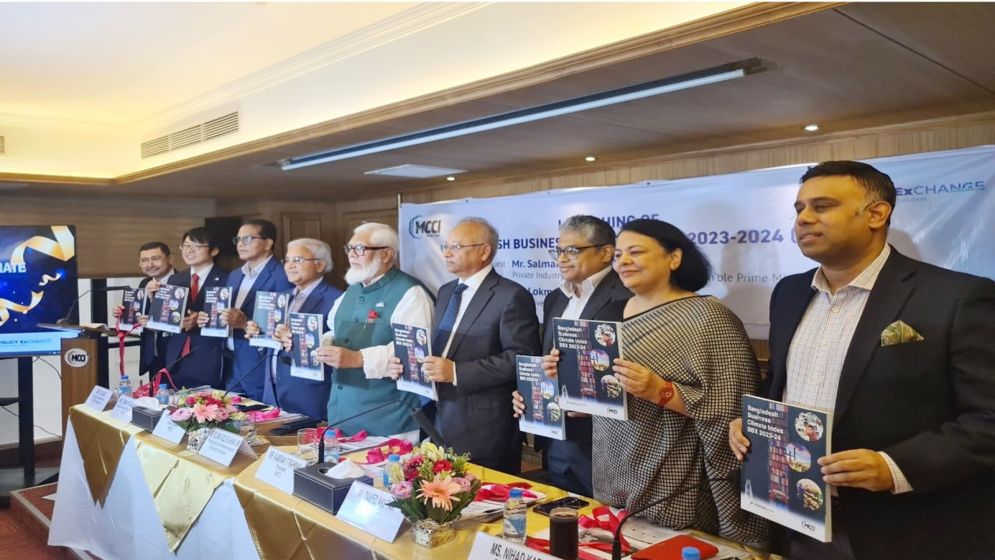Bangladesh’s business climate deteriorates 3.2% in a fiscal year: MCCI and PEB Survey
Publish: 31 May 2024, 07:44 PM

Dhaka,
May 30 (UNB)-The business environment in Bangladesh has further deteriorated,
according to a survey report.
The Business Climate
Index (BBX) survey for the financial year 2023-24 showed the score at 58.75% in
fiscal year 2023-24, down from 61.95% in the FY2022-23.
Metropolitan Chamber of
Commerce and Industry (MCCI) and research institute Policy Exchange Bangladesh
(PEB) have conducted BBX survey for the third time. The report of the survey
was released on Thursday at MCCI's Gulshan office.
BBX 2023-2024 is the
third iteration of Bangladesh's first home-grown index that gauges the
country's business climate.
This time the country's
business environment index dropped at 58.75%from 61.95% in the previous fiscal
year. That is 3.2 percentage points decreased in one year.
The survey covered 12
sectors-agriculture and forestry, construction, electronics and light
engineering, financial intermediaries, food and beverages, leather and tannery,
pharmaceuticals and chemicals, housing, ready-made garments, textiles,
transportation, retail and wholesale trade.
MCCI president Kamran T
Rahman presided over the event. He said, this survey has been done to
understand the overall business environment of the country. This survey gives
an idea about what kind of policy needs to be adopted in any sector. Policy
makers and investors will also understand which way they should go.
In his keynote
presentation, Dr. M. Masrur Reaz, Chairman and CEO, PEB, mentioned that during
2023-2024, the BBX score has dropped to 58.75% from last year's 61.95%, showing
that significant efforts are needed to address business environment challenges.
"There were
improvements in three pillars coupled with drops in seven pillars. Rajshahi was
the best performing region while Barisal came last. To unlock the country's
potential, he emphasized improving infrastructure and logistics, strengthening
financial systems, enhancing legal and regulatory frameworks, bolstering
institutional governance," he pointed out.
A dialogue was held
between Zaved Akhtar, President, FICCI, and Yuji Ando, Country Representative,
JETRO. Ando welcomed this latest BBX report and pointed out that 62 percent of
Japanese companies operating in Bangladesh were expecting to expand as per a
survey.
Akhtar emphasized the
credibility, capability, and consistency of policies and simplification of
customs, tax, and VAT frameworks in Bangladesh.
In the open forum,
topics that came up for discussion include different ways of improving the
pillar scores in the future and the need to focus more on improving access to
finance, ease of paying taxes, and policy stability.
The overall business
environment index score for the fiscal year 2021-22 was 61.01 out of 100. In
the next year FY 2022-23, that score increased marginally to 61.95. The main
reason for the lack of significant improvement in index means that 4 out of 10 indicators
worsened and the remaining 6 indicators were improving.
Like 2022, Bangladesh
has done the best in infrastructure sector in 2023 as well. The score on this
index is 71.08 out of 100. In addition, the business start index is 62.74;
53.11 in land availability index; 68.04 in the access to information index;
70.04 in labor control; 62.38 in dispute resolution; 60.87 on trade facilitation;
54.74 in tax payment; 63.50 in technology adoption and 51.59 in environmental
control.
Salman Fazlur Rahman,
Private Industry and Investment Adviser to the Prime Minister and Lokman
Hossain Miah, Executive Chairman (Senior Secretary), Bangladesh Investment
Development Authority (BIDA) were also present in the event.
END/UNB/AI/F
